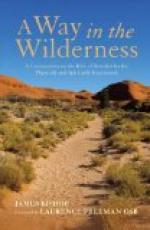As I watched them the mothers all came out from the shadows and began trotting round the opening, the little ones keeping close as possible, each one to its mother’s side. Then the old ones went faster; the calves were left in a long line stringing out behind. Suddenly the leader veered in to the edge of the timber and went over a fallen tree with a jump; the cows followed splendidly, rising on one side, falling gracefully on the other, like gray waves racing past the end of a jetty. But the first little one dropped his head obstinately at the tree and stopped short. The next one did the same thing; only he ran his head into the first one’s legs and knocked them out from under him. The others whirled with a ba-a-a-ah, and scampered round the tree and up to their mothers, who had turned now and stood watching anxiously to see the effect of their lesson. Then it began over again.
It was true kindergarten teaching; for under guise of a frolic the calves were being taught a needful lesson,—not only to jump, but, far more important than that, to follow a leader, and to go where he goes without question or hesitation. For the leaders on the barrens are wise old bulls that make no mistakes. Most of the little caribou took to the sport very well, and presently followed the mothers over the low hurdles. But a few were timid; and then came the most intensely interesting bit of the whole strange school, when a little one would be led to a tree and butted from behind till he took the jump.
There was no “consent of the governed” in that governing. The mother knew, and the calf didn’t, just what was good for him.
It was this last lesson that broke up the school. Just in front of my hiding place a tree fell out into the opening. A mother caribou brought her calf up to this unsuspectingly, and leaped over, expecting the little one to follow. As she struck she whirled like a top and stood like a beautiful statue, her head pointing in my direction. Her eyes were bright with fear, the ears set forward, the nostrils spread to catch every tainted atom from the air. Then she turned and glided silently away, the little one close to her side, looking up and touching her frequently as if to whisper, What is it? what is it? but making no sound. There was no signal given, no alarm of any kind that I could understand; yet the lesson stopped instantly. The caribou glided away like shadows. Over across the opening a bush swayed here and there; a leaf quivered as if something touched its branch. Then the schoolroom was empty and the woods all still.
There is another curious habit of Megaleep; and this one I am utterly at a loss to account for. When he is old and feeble, and the tireless muscles will no longer carry him with the herd over the wind-swept barrens, and he falls sick at last, he goes to a spot far away in the woods, where generations of his ancestors have preceded him, and there lays him down to die. It is the caribou burying ground; and all the animals of a certain district, or a certain herd (I am unable to tell which), will go there when sick or sore wounded, if they have strength enough to reach the spot. For it is far away from the scene of their summer homes and their winter wanderings.




